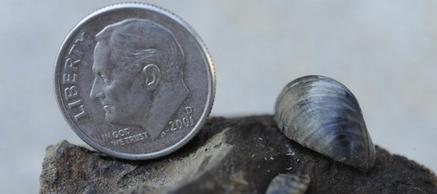DEEP Reports Zebra Mussels Discovered in Lake Zoar and Lake Lillinonah
First New Confirmation of this Invasive Species in Connecticut - 1998
The Connecticut Department of Environmental Protection (DEEP) have confirmed that the aquatic invasive species, Zebra mussel, have been discovered in Lake Zoar and Lake Lillinonah, two large impoundments on the Housatonic River in western Connecticut.
The report of an infestation of zebra mussels was first discovered in Connecticut in 1998 in East and West Twin Lakes in Salisbury. While only small numbers of the zebra mussels have been discovered so far – and it could take a relatively long period of time for them to have an impact - At this point it is uncertain if the mussels found in Lakes Lillinonah and Zoar are the result of downstream migration from upstream sources or the result of a separate introduction.
The mussel can foul boat hulls and engine cooling water systems and clog power plant, industrial and public drinking water intakes. Sites that may be affected on the Housatonic River include the hydroelectric facilities at Falls Village, Bulls Bridge, Lake Lillinonah, Lake Zoar, Lake Housatonic, and the pump-storage facility at Candlewood Lake. The DEEP Boating Division is posting signs at Lakes Lillinonah and Zoar alerting the public to the presence of the zebra mussels in those waters and listing steps they should take to prevent them from spreading. DEEP is also posting signs at nearby Lakes Candlewood and Housatonic, as well as Squantz Pond, which are all interconnected and have water qualities making them susceptible to the zebra mussels. These signs will alert the public to the fact that this invasive species has been detected in nearby water bodies and that proper precautions should be taken.
Actions anglers and boaters can take to prevent the spread of zebra mussels include:
Before Leaving A Boat Launch:
Completely drain all water from the boat, including bilge water, livewells and engine cooling systems.
Inspect your boat, trailer, and equipment. Remove and discard all aquatic plants and animals you may have picked up while on the water.
At Home:
Rinse boat, trailer and equipment with tap water. A bleach solution can be used to clean livewells. Dispose of all rinse material properly!
When Fishing:
Do not dump your bait bucket or release live bait! Avoid introducing unwanted plants and animals. Unless your bait was obtained on site, dispose of it in a suitable trash container.
Do not transport fish, other animals or plants between water bodies. Release caught fish, other animals and plants only into the waters from which they came from.
The DEEP will continue to monitor for the presence of zebra mussels at these lakes and others throughout the state. Individuals wishing to report possible sightings of zebra mussels and other aquatic nuisance species can contact DEEP’s Inland Fisheries Division at 860-424-3474. More information on zebra mussels and other aquatic nuisance species can be found on the DEEP website (www.ct.gov/dep).
Zebra Mussels in Lake Lillinonah


